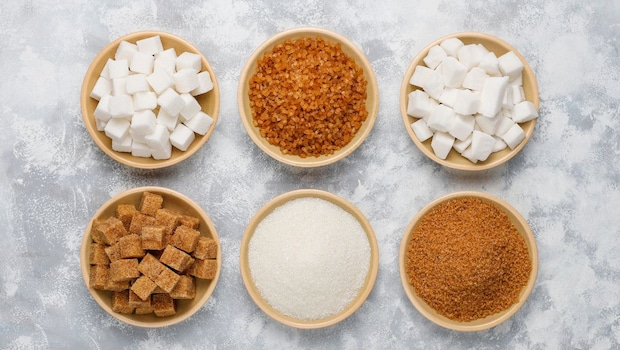Sugar is everywhere. It is in desserts, tea, sauces, and even foods we think are “healthy.” While a little sweetness can instantly lift your mood, eating sugar every day can quietly start affecting how your body feels and functions. From energy swings to changes in digestion and skin, daily sugar consumption can trigger small but noticeable shifts over time. The idea isn't to cut it out completely, but to understand what too much of it does. If you are a sweet tooth and have ever wondered what happens when you eat sugar every day for a month, here is what really goes on inside your body, and how being mindful of your intake can help you enjoy sweetness without the side-effects.
Also Read: What Happens When You Eat Soaked Walnuts Every Day For A Month
Here Are 5 Things That Happen When You Eat Sugar Every Day
1. Your Energy Levels Start To Fluctuate

Sugar gives you a quick burst of energy, but it doesn't last long. When eaten daily, this can lead to sudden highs followed by energy crashes, leaving you feeling tired or irritable. As per a meta-analysis examining sugar's effect on mood published in 2019, it was found that carbohydrate consumption, especially sugar, lowers alertness within 60 minutes of consumption, and increases fatigue within 30 minutes after consumption.
These ups and downs happen because sugar causes rapid spikes and drops in blood sugar levels. Over time, you might notice increased cravings or dependence on sweet snacks to feel alert.
2. You May Experience More Cravings
Eating sugar every day can make your body want more of it. According to a 2016 research paper, the sweet taste triggers dopamine release in the brain which is the same chemical linked to pleasure and reward. This can create a loop where you crave something sweet after every meal or during stress. Over a month, your taste buds might also get accustomed to higher sweetness levels.
3. Your Skin Might Start To Lose Its Glow

Consuming sugar daily can affect your skin's texture and brightness over time. Excess sugar can bind to proteins in the skin, reducing elasticity and hydration, which may make it look dull or tired, because of the formation of Advanced Glycation End-Products (AGEs), as per a 2022 research. You might also experience occasional breakouts if your sugar intake is consistently high.
4. You Could Feel Bloated
Sugar tends to ferment in the gut when consumed in large amounts, which can lead to bloating or discomfort. Since processed foods with added sugars also lack fibre, slowing digestion. If you eat sugary snacks daily for a month, you might notice your stomach feeling heavier or digestion becoming irregular. Staying hydrated and including probiotic foods like yoghurt or fermented vegetables can help counter these effects and restore a healthy balance in your gut.
5. You Might Notice Changes In Your Appetite And Mood
Daily sugar consumption can subtly influence how hungry or moody you feel, as per a 2019 research. The quick energy rush from sugar is often followed by a sudden drop, which may make you feel cranky, restless, or hungry sooner. Over a month, this pattern can affect your eating routine and overall mood balance.
How Much Sugar Is Okay To Eat In A Day?

The official website of National Health Service UK mentions that free sugars, which are sugars added to food or drinks, and sugars found naturally in honey, syrups, and unsweetened fruit and vegetable juices, smoothies and purees, should not make up more than 5 percent of the energy (calories) you get from food and drink each day.
This means that adults should have no more than 30g of free sugars a day, (roughly equivalent to 7 sugar cubes).
Reading labels can help spot hidden sugars in foods like sauces, breakfast cereals, and drinks. If you're eating sweets daily, try to balance them with whole foods and active habits to keep your sugar intake in check without giving up your favourite treats entirely.
Hidden Sources of Sugar You Might Be Overlooking
Here are some popular food items that are secretly packed with sugar:
- Flavoured yoghurts, breakfast cereals, granola bars, ketchup, and packaged sauces often contain more sugar than expected.
- Even “healthy” options like juices, protein bars, and salad dressings may include added sweeteners.
- Ingredients to watch out for on labels include corn syrup, maltose, and fructose syrup, all forms of sugar.
- Sugar can sneak into your diet even if you are not adding spoonfuls to your tea or coffee.
- Spotting hidden sources helps you cut back without feeling deprived of sweetness.
Healthier Ways To Satisfy Your Sweet Tooth

Here are some healthy ways to satisfy your sweet tooth at home, without relying on white sugar:
1. Swap refined sugar with natural alternatives like jaggery, dates, honey, or fruit-based desserts.
2. Snack smart by choosing dark chocolate or fruit yoghurt instead of sugary biscuits.
3. Bake with natural sweetness using mashed bananas or applesauce in place of sugar.
4. Focus on moderation. The goal isn't to remove sugar entirely, but to enjoy it in balanced amounts.
5. Keep meals nourishing by pairing sweet treats with fibre-rich or protein-based foods to avoid sugar spikes.
So, it is best to take sugar in moderation if you don't want to disrupt your well-being over taste.
Disclaimer: This content including advice provides generic information only. It is in no way a substitute for qualified medical opinion. Always consult a specialist or your doctor for more information. NDTV does not claim responsibility for this information.









